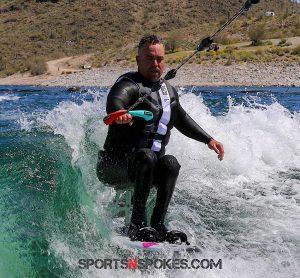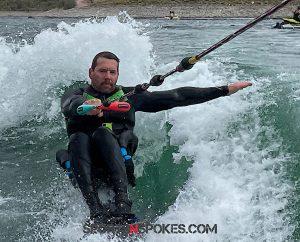Adaptive athletes compete in Wild West Wake Surf Shootout 2024
Looking out over the water, Jordan Koeninger waited patiently in a bucket seat attached to his wake board as a Centurion boat maneuvered into position.
Once he was ready, the boat driver began to accelerate; Koeninger gripped his rope handle tightly, pulling himself on top of his wake board. The cold weather and choppy water didn’t hinder him, as he surfed the boat’s wake across Lake Pleasant in Peoria, Ariz., April 5.

“I ocean surfed for a long time and really enjoyed ocean surfing, so I thought I’d give it a try and see what it was like surfing behind a boat,” says Koeninger, a 42-year-old Tempe, Ariz., resident, who sustained a level T12 spinal-cord injury (SCI) in a 2000 snowboarding accident. “In ocean surfing, I’m basically belly surfing. Here, we have some pretty unique equipment, some awesome equipment. So I can go seated, so it’s different that way. And then it’s behind a boat, so it’s a lot more controlled and easier to learn.”
Koeninger was one of three seated adaptive athletes (six adaptive athletes total) who competed in the April 5-6 Wild West Wake Surf Shootout 2024.
Part of the World Series of Wake Surfing presented by official brand partner Centurion & Supreme Boats, the event served as one of 13 qualifiers for the World Wake Surfing Championship scheduled for Oct. 9-12 in Fort Worth, Texas. While this will be the 28th year for the world championships and 22nd year for the World Series, it’s just the second year the competition has featured an adaptive category.
“One of the things Centurion is known for is being inclusive, and so I have always wanted to include the adaptive division because they a lot of times get pushed to the side, and I believe they are a competitive athlete as anybody else,” says Army veteran Shell Buchner, Centurion & Supreme Boats event and team coordinator, who helped lead the push to add the adaptive division.
The Competition
For the three seated and three standing adaptive athletes, this year’s Wild West Wake Surf Shootout was a wild ride.
The event included 80 riders overall, ranging from youth and amateur to professional and masters, in 20 divisions across six riding categories.
In the competition, riders were pulled for about 55 seconds behind a wake boat at a baseline speed of 11.3 mph, with the goal of letting go of the rope to freely ride the wave and perform tricks. Seated competitors use a bucket seat or cage attached to the wake board. Three judges scored the tricks on degree of difficulty, risk, intensity, variety and execution, and those points were added together for a total score. Riders got one pass in each direction and were allowed two falls per pass. All athletes rode once each day and were ranked, with first place receiving 100 place points, second receiving 90 and third receiving 80.
While cold weather, wind and choppy water greeted riders on the first day of competition, conditions improved on the second day.
“I think that’s why they call it the Wild West competition,” says Koeninger, who took second place in the seated adaptive category at last year’s world championships.
Koeninger started adaptive wake surfing about three years ago. He says it’s not so much about the competition, but just having another opportunity to wake surf and have fun. He got in just three practices with Arizona Adaptive Water Sports before competing at Lake Pleasant and says dropping the rope and just staying on the wake is his best trick.
“There’s a lot of expectations, a lot of build-up,” Koeninger says. “Just gotta go out there and take it easy and stay calm and enjoy yourself.”
On the second day, his more relaxed demeanor paid off, as he rode the waves to first place in the seated adaptive category. He hopes to go to a few more World Series events and get another invitation to the world championship.
“It feels awesome. I’m super stoked, incredibly grateful to all the people that made it happen,” Koeninger says. “I don’t get to do it on my own, so Arizona Adaptive Water Sports, Soulcraft surf boards, Kelly Brush Foundation, all of these rad organizations make it possible for us. I’m really grateful for the opportunity and super stoked for first place and going on to the next.”
New Experiences
For seated adaptive riders Scott Corsmeier and Brian Stockes, the whole competition was a learning experience.
Corsmeier, a 48-year-old Phoenix resident, was born with hereditary spastic paraplegia, a progressive motor neuron disorder that causes weakness and stiffness in the leg muscles. He started wake surfing last year after attending a Phoenix disability expo and meeting Jo Crawford, founder and director of Arizona Adaptive Water Sports. This was his first competition – in any sport.

“With my disability, I’ve never played any sports growing up. This past year, getting involved with Jo and having adaptive sports, it’s something I haven’t done in [48] years. It’s something that sounded fun, having this opportunity to do a competition. I’ve never experienced competition, never had the opportunity, and I’m here to take it.”
He’s only wake surfed four or five times total, but he body boarded in the ocean as a kid.
“I’ve always been a water guy,” Corsmeier says. “I just love to be on the water. Growing up in North Carolina on the East Coast, I just like being on the water. It’s just an exhilarating experience.”
He says the hardest part was learning to balance himself in the water. He came in third in this year’s event in Peoria, but he plans to keep practicing and hopes to compete in some of the other World Series events.
“My trick is not to fall down,” he says. “I’m quite new to the sport, and I have the opportunity to represent Arizona and the adaptive crew and thought it was a great opportunity for the program to show other athletes, as well as something for myself.”
It was also the first wake surfing competition for 47-year-old Dewey, Ariz., resident Stockes, who sustained a level T11-12 SCI in a 2003 truck accident. He earned second place in the seated adaptive division.
Stockes wake boarded before his injury and decided to give it another try about two years ago after bumping into Crawford at a gas station on his way to work.
“It’s a little different for sure, but at least I got back on the water, and it’s fun,” he says.
As for his strategy, he says to “stay above water, hold on and have some more fun.” Eventually, his goal is to take off without assistance.
“I just watch how he [Jordan] does certain things, too, and kind of learn. Some things work for some people and some things don’t,” Stockes says. “We’ve all got to feel it out, but all the advice at least helps give some pointers. Go from there.”
He says people with SCI and other disabilities shouldn’t be scared to try the sport.
“Most of the time, once people get on the water and have fun, they’re hooked. We just need to get it more out there,” Stockes says. “It’s a big ego booster if people take the time to get out and do it. Confidence and stuff, it’s cool.”
Get On The Water
Ultimately, riders’ top three finishes in the World Series will be averaged, and the top 10 to 12 ranked adaptive athletes will earn invitations compete in the world championships.
Registration fees are waived for adaptive athletes.
“Just seeing athletes from all around the world last year, you know, like, ‘Hey, I think your cage is too far back. Let’s just take a minute and let’s adjust it and let’s put you a little farther forward.’ I mean, it’s pretty cool,” says head judge Nicole Hudson.
For those who’d like to get their feet wet in the world of wake surfing, Hudson says there are organizations across the country, including partners Operation Wake Surf (operationwake.surf), Operation Get Out (operationgetout.org) and Our Heroes Tour (ourheroestour.org), in addition to Arizona Adaptive Water Sports (azadaptivewatersports.org), that offer coaching for various disabilities and skill levels. Many of these groups also cater to veterans, first responders and others who serve.
“All of these organizations, they have equipment. You don’t have to own a boat,” Hudson says. “It’s really about getting on the water and just being in that space and being present and finding that solace and that happiness, what the water does for all of us, and making that available to adaptive athletes.”
For information on the World Series of Wake Surfing, visit wakesurfchampionships.com.
Head to our photo gallery for more pictures from this event.
WORLD SERIES OF WAKE SURFING
Remaining stops on the World Series of Wake Surfing are as follows:
April 28: Centurion Wake Surf Kyushu Open 2024, near Kurume, Japan
May 2-4: Life is Good-Surf the Wave, Wheatland, Calif.
May 11-12: Centurion Wake Surf Hiroshima Open, Hiroshima, Japan
May 31-June 1: The Come and Take It Conroe Classic, Montgomery, Texas
June 13-15: CBK Watersports, Tennessee
June 21-22: Surf MN King of the Lakes Classic, Alexandria, Minn.
June 28-29: Southern Surf Slam, near Atlanta
July 6-7: Centurion Wake Surf Japan Open 2024, Shiga Prefecture, Japan
July 18-20: Minnesota Wakesurf Championship, Mound, Minn.
Aug. 24-25: Centurion Wake Surf Chubu Open 2024, Tokoname, Japan
Oct. 9-12: World Wake Surfing Championship, Fort Worth, Texas
FINAL RESULTS WILD WEST WAKE SURF SHOOTOUT 2024
Lake Pleasant, Peoria, Ariz., April 5-6
Adaptive Seated
1st place: Jordan Koeninger
2nd place: Brian Stockes
3rd place: Scott Corsmeier
Adaptive Standing
1st place: Eric Woody
2nd place: Joshua Stoddard
3rd place: Logan Walker